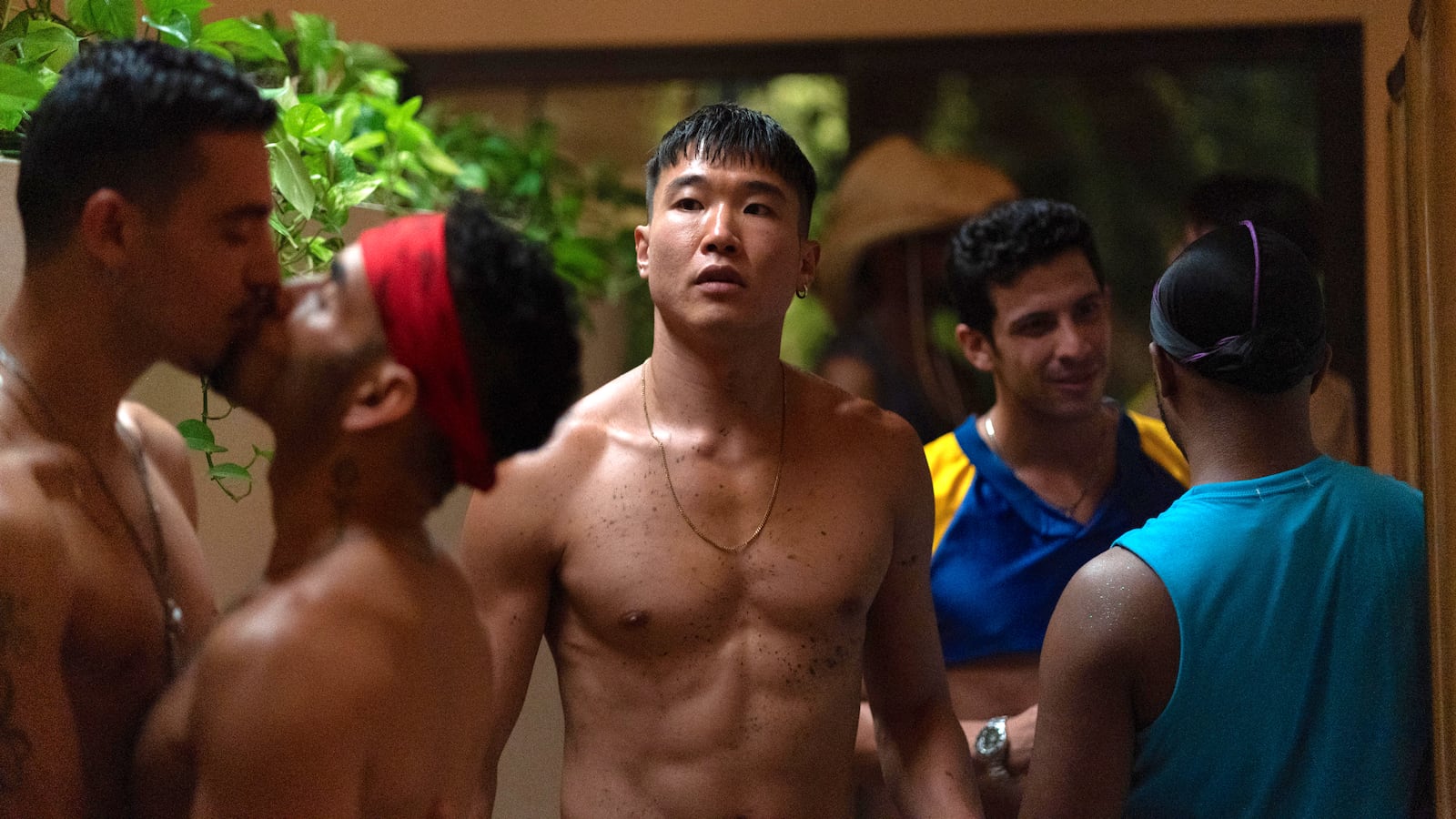The rom-com is perhaps the most formulaic of movie genres.
The storylines are often unvaried, the characterizations clichéd, and most of us can figure out who will end up with who pretty quickly.
So it makes sense that Fire Island, a new Hulu film about a group of friends on vacation in the titular gay mecca, is being championed as groundbreaking.
Normalization is a few steps past mere acceptance, and gay audiences are tired of seeing themselves in stories of tragedy, abuse, and closeted romps in cigarette-stained motel rooms.
Yet no piece of art is without its blind spots—and Fire Island, a pleasant-enough film, seems unaware of how it promotes ideas about which gay bodies are acceptable even as it condemns those same harmful stereotypes in its own script.
Joel Kim Booster, who also wrote the screenplay, plays Noah, a young man with glistening biceps. Noah is feeling a little self-conscious. He projects this feeling by pressuring his best friend Howie, played by SNL’s Bowen Yang, into having as much sex as possible (or, at least, some sex).
That two Asian gay men star in a rom-com also directed by an Asian man is a feat in and of itself—though, of course, the movie stands as a solid piece of entertainment on its own merits.
The BFF quintet is rounded out by Matt Rogers, Tomás Matos, and Torian Miller.
There are broadsides against toxic gay culture and the racism, classism, and body-shaming that comes with it.
“No fats, no femmes, no Asians,” warns Keegan, played by Matos, sarcastically repeating the racist disclaimer found on dating apps as they approach the island via ferry.
Over the course of an hour and 45 minutes, Booster delivers a painfully accurate account of gay taxonomy. I sometimes found myself wincing, imagining what I’d feel—or how I imagine I’d be treated—in such a crowded and horny environment as a fat gay man of color myself.
When Rogers’ character Luke says hi to a group of men, one shouts back, “No thanks!”
“This place is so toxic,” Howie says.
We see the contrast between our rag-tag protagonists and the island’s typical visitor at a house party later that day.
“A lot of people think you have to be successful, white, and rich with 7 percent body fat to vacation on Fire Island. Those people are all at this party,” Noah narrates.
The mansion is enormous. A ripped, shirtless man greets them by asking, rather coldly, “How can we help you?”
This kind of incisive commentary feels refreshing, especially for anyone who’s felt out of place in their own community. But the movie does little to move past established standards for what a gay body worthy of love and attention looks like.
Miller, a plus-size Black comic, is largely sidelined in favor of his thinner co-stars.
His character, Max, is underutilized as a bookish, sensitive type that prefers to go with the flow while his friends engage in all types of hi-jinks. (Save for one hilarious scene where, high on ketamine at the club, he looks in the mirror and exclaims: “I’m gorgeous!”)
We know nothing of his love life, and we never see him so much as flirting with another guy.
When they’re getting ready for an underwear party, Max appears covered in a bodysuit while his friends don Speedos and tighty-whities.
His virtual omission is made all the more confusing by the glimmers of self-awareness spoken by his friends.
In a scene that plays out like a sort of reckoning, Howie snaps at Noah, who’s been trying to get him laid all week. Earlier in the movie, the pair are revealed to be the closest in the bunch—a bond partly solidified by the fact that they’re both Asian.
Their race forces them to navigate the minefield that is being gay with the same level of caution. Still, there’s a clear difference in how Howie—a little shorter, a little less self-assured, and definitely less muscular, though still thin—is perceived by others on the island.
“Stop talking about this like we’re the same!” Howie begs Noah. “Stop pretending like you don’t understand how the world works.”
Later, they both end up with fit, conventionally attractive love interests, setting up a classic rom-com climax set to a Britney Spears cover.
It’s hard not to feel like the film is missing something. It stands up for the overlooked, yet it leaves us with two skinny gay couples who found each other in a sea of other skinny gay men.
I fear that Bros, another gay rom-com premiering in theaters this fall, could end up as more of the same. Written by and starring Billy Eichner, it features a who’s who of gay men of the moment, including Yang. Ts Madison and Harvey Fierstein are the only two cast members of size, and their limited roles in the trailer don’t seem very promising in terms of emotional payoff.
Countless gay movies of yore, from blockbusters like Brokeback Mountain to the 2017 Finnish drama Screwed, feature the same type of gay man over and over again.
The truth is, until we normalize different bodies in real life and on screen, we will continue to overlook them—passing them up as friends, lovers or just meaningful characters.
Of course, no film should have to bear the weight of the entire community it represents, and no artist should have to answer for every societal ill in every piece of work.
Booster said it himself in an interview with The Daily Beast, in which he revealed he’s proud to be “checking a lot of boxes,” but that working on a mainstream gay film comes with a “scary amount of pressure.”
Fire Island still triumphs as a playful and sometimes heartwarming movie, even if it doesn’t quite climb out of the sandpit it dug for itself.






